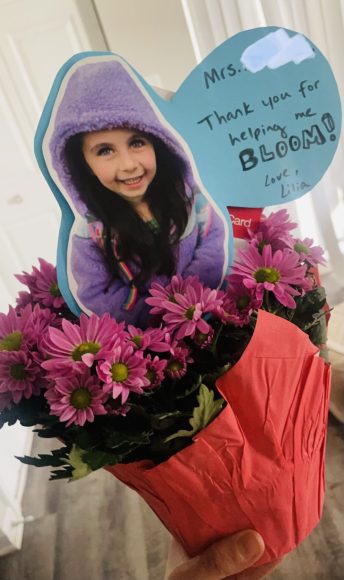Being a parent and an educator gives Rita a deeper insight into the parent-teacher relationship!
I’ve worked in education my entire life, but there was nothing that could prepare me for my own daughter’s first day of Kindergarten last year. ![]()
“Will she get lost trying to find her classroom?”
“Will she ask her teacher for help, or will she sit quietly at her desk and be overlooked?”
“How will I know she’s okay?”
I’m telling you, I do this for a living, and switching from career educator mode to parent mode was something I didn’t foresee happening. It’s like my brain temporarily erased all the things I already knew.
“She’s safe. She’s taken care of. She’s in incredible, capable hands. I don’t have to know every detail of every single day.” The voice in my head stated those affirmations, over and over again, all on my drive to work.
I knew all of that, and doubted it for a second. I know how hard it is to release our children into someone else’s hands. To trust that it’ll all be okay. I get it.
But I will say this. Our teachers are going to need our support and our understanding more than ever before. Between the pandemic worsening staff shortages, political agendas that have sparked distrust in our education system, and teachers quitting in droves from low pay, unthinkable stress, and incomprehensible expectations, the best thing we can do is work together as a team. All of the research shows that when a partnership approach between parents and teachers is evident, children’s work habits, attitudes about school, and grades improve. Trust me, moms, I’m a school psychologist. I read a lot of research. 🙂
I’d love to share some tried and true suggestions on ways to build a positive parent/teacher relationship!
#1 It’s cool to be kind
Are things beginning to go awry at your house? Cool, because they are at mine. Our kids aren’t perfect, we all know that. There comes a time in every household when you think … “Kid, I love you, but man am I ready for school to start!” Remember that your child can present with different behaviors in different settings. If something comes up in the classroom, listen to what the teacher is telling you, even if you may disagree. It is already so hard to bring any kind of issues up to parents. The majority of people who work with your child have their best interests at heart and would love nothing more than to be partners in problem-solving with you. Setting that immediate tone of mutual respect helps from conflicts arising in future conversations.
#2 Trust teachers
Teachers are trained professionals in their field and understand how to differentiate to students’ educational needs. Not only do most public school teachers complete years of post-graduate work, they are also required to attend continuous professional development every single year in order to be the absolute best they can be for our children. If teachers give feedback or advice, consider that feedback like you would feedback from any qualified professional.
#3 Teachers are people too!
Remember running into your teacher in the grocery store as a child, and how strange it was to realize that teachers have real lives too, and they don’t just live in the school building? Well, they try not to! Teachers have families, hobbies, and interests, just like we all do! And many of them are also parents, so they GET IT! Plus, they don’t go home when your kids do, although they wish they did. Forgive teachers if they don’t respond right away. Teachers are ‘on’ from the time they reach the building to the minute they drive home (which could be after a long day of work, before and after school staff meetings, hallway confrontations, surprise drills, you name it!) Teachers try to accommodate parents’ schedules the best they possibly can, but it is important to remember that their time is valuable and also deserving of respect. A delayed response is never because they don’t care – it’s because they haven’t even had the time to finish the lunch they started four hours ago.
#4 Communicate, communicate, communicate
Good communication is the keystone of any relationship, especially the one between a parent and a teacher! If there is something that needs to be shared in order for your child to have a successful day in school, it’s a great idea to let the teacher know what’s going on. Earlier this year, my co-parent and I had an open disagreement in front of our child, right before she got onto the school bus. I emailed her teacher to let her know that my child’s morning may have been off and it could impact her at school. Her teacher immediately responded that she would keep an eye out, and would make sure to shower her with extra love! She also encouraged me to communicate any concerns, as our children so often bring their home lives into their classrooms.
#5 Get Involved
If you show interest in your child’s school, they will too! There are so many opportunities for involvement, even if you don’t have the hours in the day to join the PTA, plan room parties, and go on field trips like we traditionally think of when we talk about involvement. Donate some extra school supplies to the classroom, check your emails, attend parent-teacher conferences, and ask the teacher for other unique ways to connect! Parental involvement does not only occur inside the schools. When parents and families foster a positive attitude toward school, it tends to lead to better behavior and academic achievement in the classroom as well!
Let’s start off the 2022-2023 school year strong by supporting the educators who help our children grow into the amazing humans that they are! While the school year may be scary and hard sometimes, remember that we are all on the same team!
And the occasional Target gift card or thank you note never hurts either. 😉
As a teacher, what’s one thing you would like to share with parents?
Parents, what’s something you would like to share with teachers?











